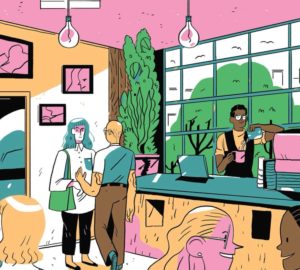Ric Rhinehart made an announcement on Coffeed earlier this week:
The team at the ECX is moving quickly to develop a solution for bringing specialty Ethiopian coffee to market that is a direct response to the issues raised by the specialty coffee community over the last twelve months. In an effort to reach the broadest possible audience and explore the latest developments from Ethiopia, the SCAA will host a Webinar on January 26, 2010 at 10:00 am Pacific. For more details, see here:
The Ethiopia Commodities Exchange is attempting to accommodate Specialty coffee trading on its platform. Peter Giuliano of Counter Culture Coffee explains on Coffeed:
A commodity exchange was established in Ethiopia in 2008, mainly for grains. The idea was to promote price transparency and food stability for Ethiopian food crops. Here’s a little op-ed piece:
http://www.philanthropyaction.com/nc/ethiopian_exchange_looks_promisingand a news item:
http://www.ifpri.org/pressrel/2008/20080414.aspAlong the way, someone had the idea that coffee should be traded in this same commodities system. Proponents of this system say that it will standardize coffee quality,, and introduce 81 generic grades of Ethiopian coffee.
Here is how I am understanding it so far: regional milllers would tender their coffee to one of twenty or so regional warehouses. Coffee is recognized as one of 9 geographically based “types”, and its quality is graded from 1 to 9. Therefore you might have a Sidama A grade 2 or a Harrar B grade 5. Coffee would carry no other designation other than that. The warehouses package the coffee into standardized bags, where it is brought to Addis and traded there as a commodity. Therefore, you can buy however many bags of Sidama A grade 2 on a given day for a given price.
Here is the rub: independent millers like Abdullah Bagersh (owner of Idido mill) or the Ogsadeys (owners of Horse mills) who buy coffee from farmers, mill it, escort it through the auction system and export it under their own mark will no longer be able to do this. They will be required to sell the produce of their mills to the commodity system, where its provenance will be lost.
There appears to be an exception: that farmers may sell their own produce directly. This will allow large plantations and co-ops (who are indistinguishable under Ethiopian law from individual farmers) to export their own coffee. So this system would effectively commoditize the private-mill coffees, and the only farmers in Ethiopia who would have access to the specialty market would be co-ops and large farms. It would also limit access to the organic market to these same players. Remember, Idido and Horse are not co-ops, they are privately owned mills, as are Haicof, Ambessa, etc.
I have also heard that the commodity exchange may not apply to dry processed Eastern Ethiopian coffees.
Join the conversation on January 26, 2009. Free to SCAA members, $99.00 for non-members.
More from the SCAA Facebook page:
Specialty Coffee & Ethiopia:
The changes, their impact, and new developments explained
A webinar with Ric Rhinehart & Peter GiulianoSubject: Changes in the Ethiopian coffee sector have created much confusion and challenge for our industry, but as a result of SCAA advocacy, there are new developments – most notably the Direct Specialty Trade (DST) initiative – that point to a viable solution. Join us for a web-based session to increase understanding of the issues and their potential impact.
Price: This webinar is free to SCAA members. Non-members may register for just $99.00. To enjoy this member benefit and more, purchase a SCAA membership today!
Click to register: https://www.netforumondemand.com/eweb/shopping/shopping.aspx?logoff=yes&site=scaa10&prd_key=7ea8bd7e-1481-44e9-85f9-53c6e7ec806f
PLEASE NOTE: After completing this initial registration process (and providing payment, if necessary), you will receive an email confirmation with a link to register for the webinar. If you have not previously used this service, you will be prompted to download the GoToWebinar software. We recommend you complete this 24 hours prior to the webinar to avoid missing out on any of the vital information that will be presented.
Coffeed – Ethiopia Commodities Exchange

































